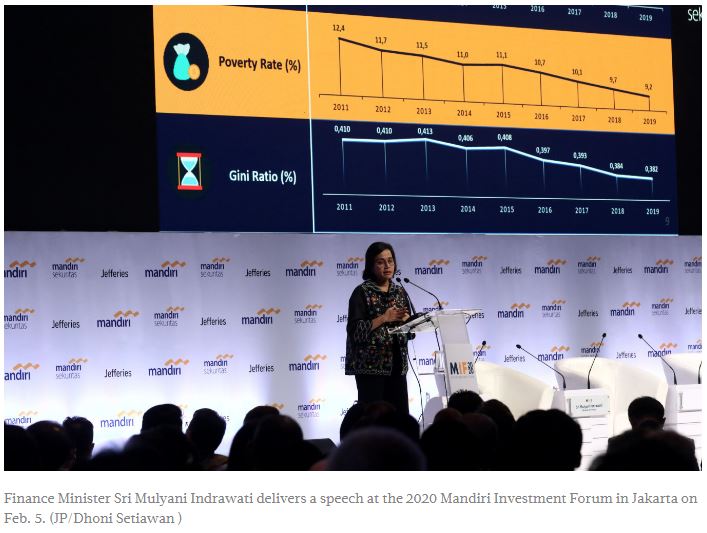Indonesia: COVID-19 impact far more complex than 2008 crisis: Sri Mulyani
As the government prepares a second fiscal stimulus package to support the economy, Finance Minister Sri Mulyani Indrawati warns that the economic impacts of the COVID-19 coronavirus outbreak will be far more complicated than that of the 2008 financial crisis.
Driven by the United States subprime mortgage debacle, the 2008 financial crisis mostly affected financial institutions, banks and the capital market, she explained on Thursday. Meanwhile, COVID-19 is affecting broader business sectors, including tourism, transportation, trade, manufacturing and investment.
“[COVID-19] has hit the real economy because it deals with people’s willingness to move around and conduct activities, so the risk would be in the real economy,” Sri Mulyani told reporters after a limited cabinet meeting at the State Palace in Central Jakarta.
“The possibility of job terminations comes from companies who cannot operate as usual, such as airlines, hotels and also the manufacturing sector, which is experiencing a disruption in the supply chain. Although there could be effects on the financial sector because it could create NPLs [non-performing loans].”
The government is currently preparing a second fiscal stimulus package to cushion the economy from negative effects of the novel coronavirus, especially on tourism and export- and import-oriented industries, especially manufacturing.
This follows last week’s unveiling of a Rp 10.3 trillion (US$722 million) stimulus package to support consumer spending and tourism. Bank Indonesia estimates the country’s economic growth to slow to a three-year low of 4.9 percent in the first quarter, from 4.97 percent in the fourth quarter of 2019.
Sri Mulyani said COVID-19 was also a much more complicated issue as it involves humans and their lives, unlike the 2008 crisis where the effects on the people were more indirect, such as via financial institutions and big corporations.
“People’s activities are suddenly partially paralyzed as schools are closed, factories are closed and people are working from home. Therefore, we should pay attention to the impacts [of the virus],” she added.
Indonesian Chamber of Commerce and Industry (Kadin) chairman Rosan Roeslani said business players were waiting for policy relaxations related to export and import activities as one of the anticipatory measures to shield Indonesia’s economy from the effects of COVID-19.
“Yes, we have talked about fiscal and monetary policies […] We also discussed matters related to exports and imports,” Rosan said, acknowledging that the virus had caused a decline in the sales and production of several industries, including automotive businesses and tourism.
However, Rosan denied claims that the coronavirus had resulted in layoffs and a shortage of raw materials, as feared by many business players and policymakers.
Indonesian Employers Association (Apindo) chairman Hariyadi Sukamdani said fears over mobility and traveling had severely affected sectors related to travel and tourism, as well as the meeting, incentives, convention and exhibition (MICE) industry.
There have been many cancellations of events due to growing concern over the spread of the coronavirus, he said, urging the public to remain vigilant in the short-term.
“I think conditions will return to normal within the next three months. However, globally, it really depends on how long it takes for other countries to recover from this issue,” said Hariyadi, who is also chairman of the Indonesian Hotel and Restaurant Association (PHRI).
Worldwide, more than 98,000 people have been infected with COVID-19 and 3,300 have died, with China, South Korea, Italy, Iran and Japan the worst affected. Indonesia confirmed on Monday its first two COVID-19 cases and is testing more suspected patients.
Source: https://www.thejakartapost.com/news/2020/03/06/covid-19-impact-far-more-complex-than-2008-crisis-sri-mulyani.html


 Thailand
Thailand




